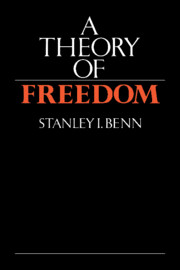Book contents
- Frontmatter
- Contents
- Foreword
- Preface
- Acknowledgments
- 1 Persons and values
- 2 Practical rationality and commitment
- 3 Reasons in conflict: Quandaries and consistency
- 4 Values and objectivity
- 5 Natural personality and moral personality
- 6 The principle of respect for persons
- 7 Freedom of action
- 8 Freedom as autarchy
- 9 Autonomy and positive freedom
- 10 Autonomy, integration, and self-development
- 11 Self-realization, instinctual freedom, and autonomy
- 12 Autonomy, association, and community
- 13 Human rights and moral responsibility
- 14 The principle of privacy
- 15 Interests in privacy
- 16 Conclusion: A semantic theory of freedom
- Notes
- Index
12 - Autonomy, association, and community
Published online by Cambridge University Press: 04 December 2009
- Frontmatter
- Contents
- Foreword
- Preface
- Acknowledgments
- 1 Persons and values
- 2 Practical rationality and commitment
- 3 Reasons in conflict: Quandaries and consistency
- 4 Values and objectivity
- 5 Natural personality and moral personality
- 6 The principle of respect for persons
- 7 Freedom of action
- 8 Freedom as autarchy
- 9 Autonomy and positive freedom
- 10 Autonomy, integration, and self-development
- 11 Self-realization, instinctual freedom, and autonomy
- 12 Autonomy, association, and community
- 13 Human rights and moral responsibility
- 14 The principle of privacy
- 15 Interests in privacy
- 16 Conclusion: A semantic theory of freedom
- Notes
- Index
Summary
Communitarian critiques of liberal individualism
Autonomy as understood in the liberal individualist tradition has come under fire in recent years from critics who denounce the entire tradition as dehumanizing and the kind of society that it informs as alienating. It rests, they say, on a model of man that is descriptively inadequate and morally defective, and the quasi-contractual theories of human association that derive from it are invalidated by their faulty foundation. In Chapter 10 of Politics and Vision, Sheldon Wolin brings together a variety of such criticisms to illustrate “one of the dominant themes of modern thought, the revival of social solidarity.” Sociology and psychology, he claims, “have agreed that modern man is desperately in need of ‘integration.’” His need to “belong” and to experience satisfying relations with others can be fulfilled if he is able to identify himself with an adequate group, one which will provide him with membership, a defined role and assured expectations. Ours is “an organizational age which longs for community.”
Human beings, it is said, have a need for mutually supportive relations, a need the liberal theory of man and society ignores. Consequently, the account I have given of respect for persons, of the relations of forbearance between autarchic persons who recognize in each other a common moral personality, might be taken, perhaps, as legitimizing cold indifference, a standoff between individuals who care nothing for one another. And so it does, as far as it goes, for it is an account of a minimal condition for moral relations between persons – it is not an ideal.
- Type
- Chapter
- Information
- A Theory of Freedom , pp. 213 - 235Publisher: Cambridge University PressPrint publication year: 1988



